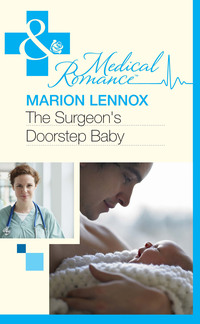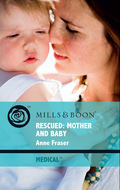Raamatut ei saa failina alla laadida, kuid seda saab lugeda meie rakenduses või veebis.
Loe raamatut: «The Surgeon's Doorstep Baby»

About the Author
MARION LENNOX is a country girl, born on an Australian dairy farm. She moved on—mostly because the cows just weren’t interested in her stories! Married to a ‘very special doctor’, Marion writes Medical Romances™, as well as Mills & Boon® Romances. (She used a different name for each category for a while—if you’re looking for her Romances, search for author Trisha David as well.) She’s now had well over 90 romance novels accepted for publication.
In her non-writing life Marion cares for kids, cats, dogs, chooks and goldfish. She travels, she fights her rampant garden (she’s losing) and her house dust (she’s lost). Having spun in circles for the first part of her life, she’s now stepped back from her ‘other’ career, which was teaching statistics at her local university. Finally she’s reprioritised her life, figured out what’s important, and discovered the joys of deep baths, romance and chocolate. Preferably all at the same time!
Recent titles by Marion Lennox:
SYDNEY HARBOUR HOSPITAL: LILY’S SCANDAL†
DYNAMITE DOC OR CHRISTMAS DAD?*
THE DOCTOR AND THE RUNAWAY HEIRESS*
NIKKI AND THE LONE WOLF**
MARDIE AND THE CITY SURGEON**
†Sydney Harbour Hospital
*Mills & Boon® Medical™ Romance
**Mills & Boon® Romance Banksia Bay miniseries
These books are also available in eBook format from www.millsandboon.co.uk
The Surgeon’s
Doorstep Baby
Marion Lennox
MILLS & BOON
Before you start reading, why not sign up?
Thank you for downloading this Mills & Boon book. If you want to hear about exclusive discounts, special offers and competitions, sign up to our email newsletter today!
Or simply visit
Mills & Boon emails are completely free to receive and you can unsubscribe at any time via the link in any email we send you.
Dear Reader
This year our family farm is to be leased out as my brother retires from farming. One of the next generation may well decide farming’s the life for them, but it needs to be a decision they make in the future, when the time’s right for them. Thus, for now, more than a hundred years of farming history is pausing.
For me this is a sadness. Although I’ve long left behind the reality of twice-daily milking, our family farm has never lost its power, its warmth, its pull. Happily, though, I can still disappear into a farming community in my books.
As you might have read in my introduction to MARDIE AND THE CITY SURGEON, recently the farm was flooded. At midnight a neighbour rang my brother to say the river had broken its banks, and a paddock full of calves was disappearing under water. My brother and sister-in-law thus spent the night in their kids’ ancient canoe, saving every one of their calves.
The story was a fun one, with a happy ending, and the half-grown calves reacted like excited kids when they were finally rescued. The story made me smile—and, as always, it made me think, What if …? What if I threw my city surgeon hero into such a scene? What if my heroine had to depend on him? What if … what if I even threw a wounded baby into the mix?
I love my writing, where reality and fantasy can mingle to become pure fun. As you read this, however, know that the calves are real, the happy ending is true and each rescued calf is now a safe and cared-for member of a magnificent herd. Our farm—our heritage—stays alive in the hearts of every one of our family members, and hopefully in the warmth and fun my writing enables me to share.
Warm wishes from a bit of an emotional
Marion
Dedication:
To Cobrico. To Mayfield. To my beloved family who form the bedrock of who I am.
CHAPTER ONE
As CHIEF orthopaedic surgeon for one of Sydney’s most prestigious teaching hospitals, Blake Samford was used to being woken in the middle of the night for emergencies.
Right now, however, he was recuperating at his father’s farm, two hundred miles from Sydney.
He wasn’t expecting an emergency.
He wasn’t expecting a baby.
Maggie Tilden loved lying in the dark, listening to rain on the corrugated-iron roof. She especially liked lying alone to listen.
She had a whole king-sized bed to herself. Hers, all hers. She’d been renting this apartment—a section of the grandest homestead in Corella Valley—for six months now, and she was savouring every silent moment of it.
Oh, she loved being free. She loved being here. The elements could throw what they liked at her; she was gloriously happy. She wriggled her toes luxuriously against her cotton sheets and thought, Bring it on, let it rain.
She wasn’t even worried about the floods.
This afternoon the bridge had been deemed unsafe. Debris from the flooded country to the north was being slammed against the ancient timbers, and the authorities were worried the whole thing would go. As of that afternoon, the bridge was roped off and the entire valley was isolated.
Residents had been advised to evacuate and many had, but a lot of the old-time farmers wouldn’t move if you put a bulldozer under them. They’d seen floods before. They’d stocked up with provisions, they’d made sure their stock was on high ground and they were sitting it out.
Maggie was doing the same.
A clap of thunder split the night and Tip, the younger Border collie, whined and edged closer to the bed.
‘It’s okay, guys,’ she told them, as the ancient Blackie moved in for comfort as well. ‘We’re safe and dry, and we have a whole month’s supply of dog food. What else could we want?’
And then she paused.
Over the sound of the driving rain she could hear a car. Gunned, fast. Driving over the bridge?
It must have gone right around the roadblock.
Were they crazy? The volume of water powering down the valley was a risk all by itself. There were huge warning signs saying the bridge was unsafe.
But the bridge was still intact, and the car made it without mishap. She heard the change in noise as it reached the bitumen on this side, and she relaxed, expecting the car’s noise to fade as it headed inland.
But it didn’t. She heard it turn into her driveway—okay, not hers, but the driveway of the Corella View Homestead.
If the car had come from this side of the river she’d be out of bed straight away, expecting drama. As district nurse, she was the only person with medical training on this side of the river—but the car had come from the other side, where there was a hospital and decent medical help.
She’d also be worrying about her brother. Pete was in the middle of teenage rebellion, and lately he’d been hanging out with some dubious mates. The way that car was being driven … danger didn’t begin to describe it.
But this was someone from the other side. Not Pete. Not a medical emergency. Regardless, she swung her feet out of bed and reached for her robe.
And then she paused.
Maybe this was a visitor for her landlord.
A visitor at midnight?
Who knew? She hardly knew her landlord.
Blake Samford was the only son of the local squattocracy—squattocracies being the slang term for families who’d been granted huge tracts of land when Australia had first been opened to settlers and had steadily increased their fortunes since. The Corella Valley holding was impressive, but deserted. Blake had lived here as a baby but his mother had taken him away when he was six. The district had hardly seen him since.
This, however, was his longest visit for years. He’d arrived three days ago. He was getting over appendicitis, he’d told her, taking the opportunity to get the farm ready for sale. His father had been dead for six months. It was time to sell.
She’d warned him the river was rising. He’d shrugged.
‘If I’m trapped, I might as well be truly trapped.’
If he was having visitors at midnight, they’d be trapped with him.
Maybe it’s a woman, she thought, sinking back into bed as the car stopped and footsteps headed for Blake’s side of the house—the grand entrance. Maybe he’d decided if he was to be trapped he needed company. Was this a woman ready to risk all to reach her lover?
Who knew? Who knew anything about Blake Samford?
Blake was a local yet not a local. She’d seen him sporadically as a kid—making compulsory access visits to his bully of a father, the locals thought—but as far as she knew he hadn’t come near when his father had been ill. Given his father’s reputation, no one blamed him. Finally she’d met him at the funeral.
She’d gone to the funeral because she’d been making daily medical checks on the old man for the last few months of his life. His reputation had been appalling, but he’d loved his dogs so she’d tried to convince herself he hadn’t been all bad. Also, she’d needed to talk to his son about the dogs. And her idea.
She hadn’t even been certain Blake would come but he’d been there—Blake Samford, all grown up. And stunning. The old ladies whispered that he’d inherited his mother’s looks. Maggie had never known his mother, but she was definitely impressed by the guy’s appearance—strong, dark, riveting. But not friendly. He’d stood aloof from the few locals present, expressionless, looking as if he was there simply to get things over with.
She could understand that. With Bob Samford as a father, it had been a wonder he’d been there at all.
But Maggie had an idea that needed his agreement. It had taken courage to approach him when the service had ended, to hand over her references and ask him about the housekeeper’s apartment at the back of the homestead. To offer to keep an eye on the place as well as continuing caring for the dogs his dad had loved. Harold Stubbs, the next-door landowner, had been looking after Bob’s cattle. The cattle still needed to be there to keep the grass down, but Harold was getting too old to take care of two herds plus the house and the dogs. Until Blake sold, would he like a caretaker?
Three days later a rental contract had arrived. She’d moved in but she hadn’t heard from him since.
Until now. He was home to put the place on the market.
She’d expected nothing less. She knew it’d be sold eventually and she was trying to come up with alternative accommodation. She did not want to go home.
But right now her attention was all on the stupidity of his visitors driving over the bridge. Were they out of their minds?
She was tempted to pull back the drapes and look.
She heard heavy footsteps running across the veranda, and the knocker sounded so loudly it reverberated right through the house. The dogs went crazy. She hauled them back from the door, but as she did she heard the footsteps recede back across the veranda, back down the steps.
The car’s motor hadn’t been cut. A car door slammed, the engine was gunned—and it headed off the way it had come.
She held her breath as it rumbled back across the bridge. Reaching the other side. Safe.
Gone.
What on earth …?
Kids, playing the fool?
It was not her business. It was Blake’s business, she told herself. He was home now and she was only caring for her little bit of the house.
Hers. Until Blake sold the house.
It didn’t matter. For now it was hers, and she was soaking up every minute of it.
She snuggled back down under the covers—alone.
If there was one thing Maggie Tilden craved above everything else, it was being alone.
Bliss.
On the other side of the wall, Blake was listening, too. He heard the car roar over the bridge. He heard the thumps on his front door, the running footsteps of someone leaving in a hurry, and the car retreating back over the bridge.
He also thought whoever it was must be crazy.
He and his tenant—Maggie Tilden—had inspected the bridge yesterday. The storm water had been pounding the aged timbers; things were being swept fast downstream—logs, debris, some of it big. It was battering the piles.
‘If you want to get out, you should go now,’ Maggie had said. ‘The authorities are about to close it.’
Did it matter? He’d been ordered to take three weeks off work to recuperate from appendicitis. He needed to sort his father’s possessions, so what difference did it make if he was stranded while he did it?
‘It’s up to you,’ Maggie had said, as if she didn’t mind either way, and she’d headed back to her part of the house with his father’s dogs.
She kept to herself, for which he was profoundly grateful, but now … A knock at midnight. A car going back and forth over the bridge.
Was this some friend of hers, playing the fool? Leaving something for her at the wrong door?
Whoever they were, they’d gone.
On Maggie’s side of the house he’d heard the dogs go crazy. He imagined her settling them. Part of him expected her to come across to check what had just happened.
She didn’t.
Forget it, he told himself. Go back to bed.
Or open the door and make sure nothing had been left?
The knock still resonated. It had been loud, urgent, demanding attention.
Okay, check.
He headed for the front door, stepped outside and came close to falling over a bundle. Pink, soft …
He stooped and tugged back a fold of pink blanket.
A thick thatch of black hair. A tiny, rosebud mouth. Snub nose. Huge dark eyes that stared upwards, struggling to focus.
A tiny baby. Three weeks at most, he thought, stunned.
Lying on his doorstep.
He scooped the infant up without thinking, staring out into the night rather than down at the baby, willing the car to be still there, willing there to be some sort of answer.
The bundle was warm—and moist. And alive.
A baby …
He had nothing to do with babies. Yeah, okay, he’d treated babies during medical training. He’d done the basic paediatric stuff, but he’d been an orthopaedic surgeon for years now, and babies hardly came into his orbit.
A baby was in his orbit now. In his arms.
He stared down at the baby, and wide eyes stared back.
A memory stabbed back. A long time ago. Thirty or more years? Here, in this hall.
A woman with a baby, placing the baby by the door in its carry basket, pointing at Blake and saying, ‘I’ve brought the kid his baby sister.’
After that, his memory blurred. He remembered his father yelling, and his mother screaming invective at his father and at the woman. He remembered the strange woman being almost hysterical.
He’d been six years old. While the grown-ups had yelled, he’d sidled over and looked at the baby it seemed everyone was yelling about. She’d been crying, but none of the grown-ups had noticed.
A baby sister?
He shook himself. That had been the night his mother had found out about his father’s lover. He’d never seen either the woman or her baby again.
This baby was nothing to do with his history. Why was he thinking of it now?
He should call the police. He should report an abandoned baby.
Who looked like a baby he’d seen a long time ago?
And then he thought of Maggie, his tenant, and he remembered the references she’d given him.
She was the district nurse and she was also a midwife.
The relief that surged over him was almost overwhelming. This was nothing to do with him. Of course it wasn’t. The whole valley knew Maggie’s job. If a woman wanted to abandon an unwanted child, what better way than dump it on a woman you knew could look after it? Maybe Maggie had even cared for the mother during her pregnancy.
‘Hey,’ he said, relaxing, even holding the baby a little tighter now he knew what he was dealing with. The child seemed to be staring straight up at him now, dark eyes wondering. ‘You’ve come to the wrong door. Okay, I know you’re in trouble but you have come to the right place—just one door down. Hold on a minute and we’ll take you to someone who knows babies. To someone who hopefully will take responsibility for getting you out of this mess.’
Maggie was snuggling back down under the duvet when someone knocked on her door and the dogs went nuts again.
What? What now?
She’d worked hard today. She’d set up the entire clinic, moving emergency gear from the hospital over the river, trying to get everything organised before the bridge closed. As well as that, she’d made prenatal checks of women on farms that were so wet right now that every able body was moving stock and if Maggie wanted her pregnant ladies to be checked then she went to them.
She was really tired.
Was this another evacuation warning? Leave now before the bridge is cut?
She’d gone to the community meeting. This house was high above the river. Short of a tsunami travelling two hundred miles inland, nothing worse was going to happen than the bridge would give way, the power would go and she’d have to rely on the old kerosene fridge for a few days.
What?
Another knock—and suddenly her irritation turned to fear. She had eight brothers and sisters. A couple of the boys were still young enough to be stupid. Pete … What if …?
What if the car had come with news?
Just open the door and get it over with.
Take a deep breath first.
She tucked her feet into fluffy slippers, wrapped her ancient bathrobe around her favourite pyjamas and padded out to the back porch.
She swung open the door—and Blake Samford was standing in the doorway, holding a baby.
‘I think this one’s for you,’ he said, and handed it over.
She didn’t drop it.
To her eternal credit—and thinking back later she was very, very proud of herself—she took the baby, just like the professional she was. Nurse receiving a baby at handover. She gathered the baby as she’d gather any infant she didn’t know; any child when she didn’t know its history. Taking care to handle it lightly with no pressure, anywhere that might hurt. Cradling it and holding it instinctively against her body, giving warmth as she’d give warmth to any tiny creature.
But for the moment her eyes were on Blake.
He looked almost forbidding. He was looming in her doorway, six feet two or three, wide shoulders, dark, dark eyes made even darker by the faint glow of moonlight, deep black hair, a shadowy figure.
Tall, dark and dangerous.
Heathcliff, she thought, suddenly feeling vaguely hysterical. Very hysterical. Here she was presented with a baby at midnight and she was thinking romance novels?
The dogs were growling behind her. They’d met this guy—he’d been here for three days and she’d seen him outside, talking to them—but he was still a stranger, it was midnight and they didn’t know what to make of this bundle in their mistress’s arms.
Neither did she, but a baby was more important than the dark, looming stranger on her doorstep.
‘What do you mean, you think it’s for me?’ she managed, trying not to sound incredulous. Trying to sound like he’d just dropped by with a cup of sugar she’d asked to borrow earlier in the day. She didn’t want to startle the dogs. She didn’t want to startle the baby.
She didn’t want to startle herself.
‘Someone’s obviously made a mistake,’ he told her. ‘You’re the local midwife. I assume they’ve dumped the baby here to leave it with you.’
‘Who dumped it?’ She folded back the blanket and looked down into the baby’s face. Wide eyes gazed back at her. Gorgeous.
She loved babies. She shouldn’t—heaven knew, she’d had enough babies to last her a lifetime—but she had the perfect job now. She could love babies and hand them back.
‘I don’t know who dumped it,’ he said, with exaggerated patience. ‘Didn’t you hear the car? It came, the baby was dumped, it left.’
She stared up at him, incredulous. He met her gaze, and didn’t flinch.
An abandoned baby.
The stuff of fairy-tales. Or nightmares.
She switched her gaze to the little one in her arms.
‘Who are you?’ she whispered, but of course there was no answer. Instead it wrinkled its small nose, and opened its mouth—and wailed.
Only it wasn’t a wail a baby this age should make. It was totally despairing, as if this baby had wailed before and nothing had been forthcoming. It was a wail that was desperation all by itself—a wail that went straight to the heart and stayed there. Maggie had heard hungry babies before, but none like this. Unbearable. Unimaginable that a little one could be so needful.
She looked down at the sunken fontanel, the dry, slightly wrinkled skin. These were classic signs of dehydration. IV? Fast?
But if the little one could still cry …
It could indeed still cry. It could scream.
‘Can you grab the bag from the back of my car?’ she snapped, and whirled and grabbed her car keys and tossed them to him. ‘This little one’s in trouble.’
‘Trouble?’
She wheeled away, back to the settee. The fire was still glowing in the hearth. She could unwrap the baby without fear of losing warmth. ‘Basket,’ she snapped at the dogs, and they headed obediently for their baskets at each side of the fire. Then, as Blake hesitated, she fixed him with a look that had made lesser men quail. ‘Bag. Now. Go.’
He headed for the car, feeling a bit … stunned. And also awed.
The only times he’d seen Maggie Tilden she’d seemed brisk, efficient and … plain? She dressed simply for work and she’d been working the whole time he’d been here. Plain black pants. White blouse with ‘Corella Valley Medical Services’ emblazoned on the pocket. She wore minimal make-up, and her soft brown curls were tied back in a bouncy ponytail. She was about five feet four or five, she had freckles, brown eyes and a snub nose, and until tonight he would have described her as nondescript.
What he’d just seen wasn’t nondescript. It was something far from it.
What?
Cute, he thought, but then he thought no. It was something … deeper.
She’d been wearing faded pink pyjamas, fluffy slippers and an ancient powder-blue bathrobe. Her brown hair, once let loose, showed an auburn burnish. Her curls tumbled about her shoulders and she looked like she’d just woken from sleep. Standing with her dogs by her sides, the fire crackling in the background, she looked …
Adorable?
She looked everything the women in his life weren’t. Cosy. Domestic. Welcoming.
And also strong. That glare said he’d better move his butt and get her bag back inside, stat.
She wouldn’t know he was a doctor, he thought. When the baby had wailed he’d recognised, as she had, that the little creature was in trouble. The light-bulb over his door had blown long since, but once he’d been under the light of her porch he’d seen the tell-tale signs of dehydration, a baby who looked underweight; malnourished. He’d reached to find a pulse but her movement to defend the child was right. Until she knew what was wrong, the less handling the better.
She was reacting like a midwife at her best, he thought with something of relief. Even if she needed his help right now, this baby wasn’t his problem. She was more than capable of taking responsibility.
She was a professional. She could get on with her job and he could move away.
Get the lady her bag. Now.
The bag was a huge case-cum-portable bureau, wedged into the back of an ancient family wagon. He grabbed it and grunted as he pulled it free—it weighed a ton. What was it—medical supplies for the entire valley? How on earth did a diminutive parcel like Maggie handle such a thing?
He was a week out from an appendectomy. He felt internal stitches pull and thought of consequences—and headed for the back door and grabbed the wheelbarrow.
Medical priorities.
If he broke his stitches he’d be no use to anyone. Worse, he’d need help himself.
One bag coming up. By barrow.
He pushed his way back into the living room and Maggie’s eyes widened.
She’d expected landlord with a bag.
What she got was landlord, looking a bit sheepish, with her firewood-carting wheelbarrow, plus bag.
‘Appendectomy,’ he said before she could say a word. ‘Stitches. You don’t want two patients.’
Oh, heck. She hadn’t thought. He’d told her he was here recovering from an appendectomy. She should have …
‘It’s fine,’ he said, quickly, obviously seeing her remorse. ‘As long as you don’t mind tyre tracks on your rugs.’
‘With my family I’m not used to house-proud. Thanks for getting it. Are you okay?’
‘Yes.’
She cast him a sharp, assessing look, and he thought she was working out the truth for herself, and she figured he was telling it.
‘If I tell you how, can you make up some formula? This little one’s badly dehydrated.’
‘Can I see?’ he said, over the baby’s cries.
The baby was still wailing, desperation personified.
He stooped beside her. He didn’t try and touch the baby, just pushed back the coverings further from its face.
Maggie had obviously done a fast check and then re-wrapped the infant, leaving the nappy on, tugging open the stained grow suit to the nappy but leaving it on, rewrapping the baby in the same blanket but adding her own, a cashmere throw he’d seen at the end of the sofa.
With the blankets pulled aside and the grow suit unfastened, he could see signs of neglect. This was no rosy, bouncing baby. He could see the tell-tale signs of severe nappy rash, even above the nappy. He could see signs of malnourishment.
She was right about dehydration. They needed to get the little one clean and dry—but first they needed to get fluids in and if it was possible, the best way was by mouth.
‘Tell me where, tell me how,’ he said, and she shot him a grateful glance and proceeded to do just that. Five minutes later he had a sterilised bottle filled with formula, he offered it to Maggie, she offered it to one tiny baby—who latched on like a leech and proceeded to suck like there was no tomorrow.
The sudden silence was deafening. Even the dogs seemed to sigh in relief.
Maggie’s wide, expressive mouth curved into a smile. ‘Hey,’ she said softly. ‘You’ve just saved yourself from evacuation, hospital and IV drips. Now, let’s see what we have here.’ She glanced up at Blake. ‘Are you man enough to cope with the nappy? I’d normally not try and change a baby in mid-feed but this one’s practically walking on its own and I hate to imagine what it’s doing to the skin. It needs to be off but I don’t want to disturb the baby more than necessary. While the bottle’s doing the comforting we might see what we’re dealing with.’
He understood. Sort of. There was a medical imperative.
What he’d really like to do was offer to take over the holding and feeding while she coped with the other end, but he’d missed his opportunity. There was no way they should interrupt established feeding when it was so important. This baby needed fluids fast, and Maggie was the one providing them.
So … the other end.
He was a surgeon. He was used to stomach-churning sights.
He’d never actually changed a baby’s nappy.
‘You’ll need a big bowl of warm, soapy water,’ she told him. ‘The bowl’s in the left-hand cupboard by the stove. Get a couple of clean towels from the bathroom and fetch the blue bottle on the top of my bag with the picture of a baby’s bottom on the front.’
‘Right,’ he said faintly, and went to get what he needed, with not nearly the enthusiasm he’d used to make the formula.
Baby changing. He had to learn some time, he supposed. At some stage in the far distant future he and Miriam might have babies. He thought about it as he filled the bucket with skin-temperature water. He and Miriam were professional colleagues having a somewhat tepid relationship on the side. Miriam was dubious about attachment. He was even more dubious.
He suspected what he was facing tonight might make him more so.
‘Oi,’ Maggie called from the living room. ‘Water. Nappy. Stat.’
‘Yes, Nurse,’ he called back, and went to do her bidding.
Tasuta katkend on lõppenud.









